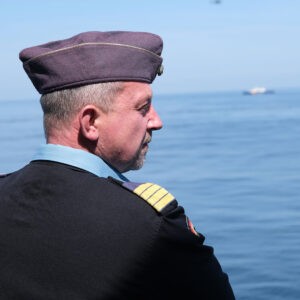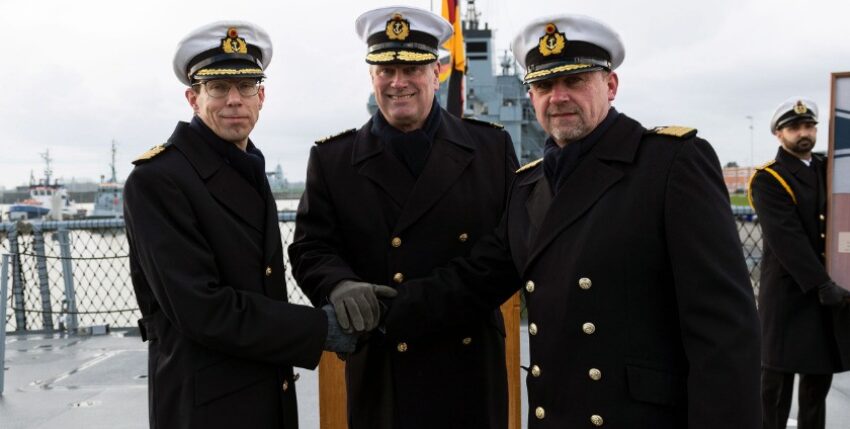When Flotilla Admiral Axel Schulz, Commander of Operational Flotilla 2, handed over command of the 4th Frigate Squadron on 19 January, it was not the kind of ceremony we are used to at the Heppenser Groden naval base. Kapitän zur See Dirk Jacobus handed over his four BADEN-WÜRTTEMBERG-class ships to Kapitän zur See Matthias Schmitt, thus ending a period in command that, at five and a half years, not only represents a record, but also a turning point in the navy. When Jacobus took over the squadron, the frigate BADEN WÜRTTEMBERG had only been in the water for a year and was returned to the manufacturer in 2017 due to various defects. Jacobus, who was still able to rely on the last "workhorses" of Class 122 with KARLSRUHE, AUGSBURG and LÜBECK, was finally able to see the first 125 enter service in 2019. Since the commissioning of the RHEINLAND PFALZ in July 2022, he can now boast of being the first commander of a frigate squadron who has not only led the change of an entire class, but also launched an entirely new class of ship. His successful time at the helm of the 4th Frigate Squadron was accompanied by the approaching end of a difficult period and, above all, by debates about the purpose of Class 125. Despite the doubts of some observers, Jacobus is convinced of this weapon system. After 2059 days as commander, he made a fiery plea for "his" ships, embedded in his thanks to all the crews, commanders and officers involved who paved the way for this long journey. marineforum is publishing extracts from his farewell speech.

"What surprised me most, however, was how much persuasion it took to emphasise that the development of the F 125 weapon system with the associated objectives and concept was not a mistake, neither then nor now. There were sceptics at every turn, no doubt encouraged by the corresponding media coverage, who had formed an opinion about the usefulness and effectiveness of these ships, but above all about the crews - an opinion that was overwhelmingly: They can't do anything! Not sustainable, no identity, lack of concern for the unfamiliar weapon system, not usable in combat, not a sub-hunter, not an air defender, not a warrior ...
We have laid the foundation for proving that what our forefathers came up with was not such a bad idea. We have put the reachback for the crews on a functional footing, we have so far guided four crews completely through the new EAP, which was developed independently in terms of content, and with great success. [...] In terms of a functioning overall F 125 system, individual crews often had to swallow hard to keep all crews intact in this finely meshed wheelwork; the crews always had to help each other, without reproach, even if we ourselves had made mistakes at some point. [...] Without the uncompromising backing and the creative freedom on the one hand, but also the energetic, professional and troop support of our flotilla on the other, we would certainly have got stuck in many a process dead end; instead, we were able to break through a number of "it's always been this way" walls with vehemence. I would like to take the liberty of calling out to my flotilla to continue along the path of initiative and autonomy as consistently as it is currently being travelled. [...] Probably the greatest innovation resulting from this commitment, our Multi-dimensional Naval Warfare Training Centre, is a successful model without which, in my view, operational capability is no longer conceivable, especially during Corona, but also in the long term for the high demands placed on the multi-crew model. On-site training by soldiers who come from the training system and have the necessary experience and drive to mould crews in every phase of team and individual training is one of the greatest assets the navy currently has. I can only warn against curtailing this truly successful model at some point for structural or administrative reasons. In this particular case, the strengths of something unique must be protected from system-compliant levelling, which incidentally also applies to the unique capabilities of the F 125 weapon system itself.
I also believe that taking the initiative in the area of personnel recruitment is a path that should definitely be pursued further. Authentic advertising for us is only possible with authentic people with experience and up-to-date knowledge of the profession and activities at sea. That's why we need to support the organisation with our personnel skills on the ground and in the field. For us as a navy in particular, the following applies: people inspire people - and not euphonious, buzzword-like, generalist messages that do not create any images in the minds of our young people.
Thanks also to the industry and the project - and that is only a contradiction at first glance given the years of delays. Of course, at the end of the process, we in particular often quibbled with the seemingly unnecessary hurdles that resulted from delays in concluding contracts, process conformity or unexpected underperformance, among other things. However, even sitting at the table, it must be recognised that superficial criticism of the Federal Office of Bundeswehr Equipment, Information Technology and In-Service Support (BAAINBw) or the F 125 consortium or industry falls far short of the mark. It's no mean feat to constantly adapt such a far-reaching, innovative prototype with an extremely long construction period to the evolving legal and regulatory landscape - our system is more rigid than flexible. I think we need to cut such Gordian knots early for current and future defence projects, otherwise F 125 was only the first project to be subject to such delays, but certainly not the last. I would like to thank the BAAINBw and industry for listening to us and allowing us to help shape the project. They quickly realised and quickly included in their considerations that progress is not possible without the end user.
If we succeed in escaping the personnel-related problems to some extent, for example, if we stop constantly adopting civilian standards - which are simply not suitable for the military - without question, be it in the area of working hours or in the area of training and qualifications, especially for secondary tasks, then the ships and crews will be able to do what they are supposed to do: sail and fight. Anyone who seriously believes, especially in the case of lean manning, that the constantly growing abundance of bureaucratic ancillary tasks can be linked to seagoing crews in the same way as to any other military service is mistaken. Our crews, reduced to the essentials, cannot attend every newly devised training course that the armed forces have to offer to deal with all the ancillary tasks in the areas of data protection, IT security, occupational health and safety, SAP, administration and management, etc. If this has to be the case doctrinally, then the Reachback must be able to cope with this structurally and be allowed to do so in terms of regulations - there is still a long way to go here and it is better not to go at a walking pace. We need many more [people] than before to have the courage not to make it difficult for ourselves to serve by tying up multiple security nets, we need to trust the abilities of our crews and let them concentrate on exactly what we actually have armed forces for by really relieving them of bureaucracy: National and alliance defence and the military contribution to overall national security - I think this has rarely been so vividly substantiated as by today's daily news.
Holger Schlüter







